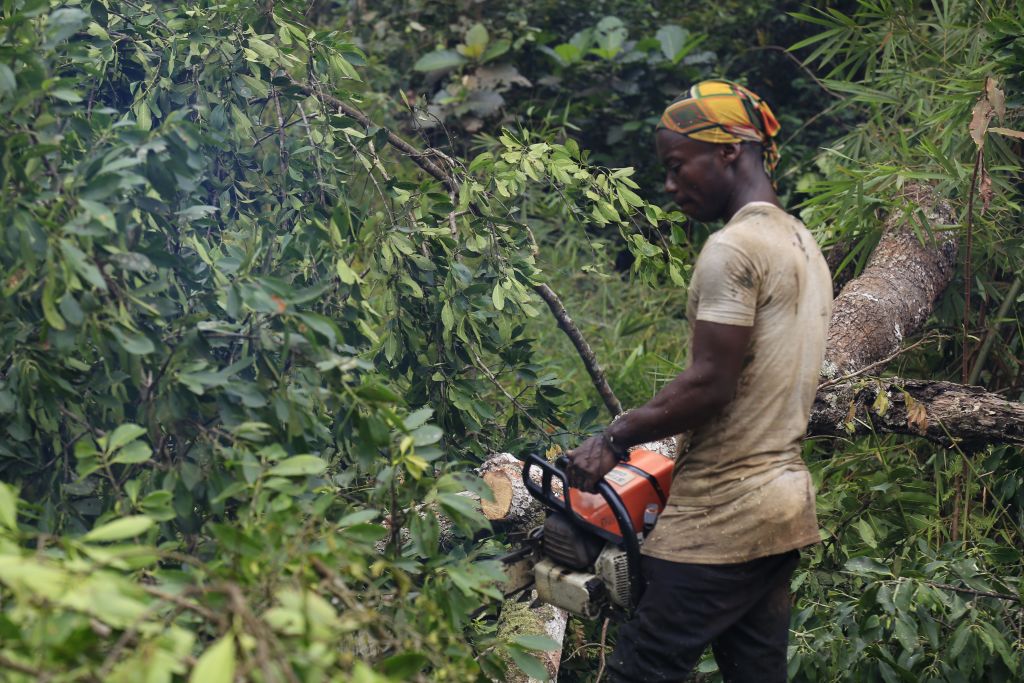ADF STAFF
A new four-part investigation by the Pulitzer Center Rainforest Investigations Network and The Africa Report shows how trees felled in the Democratic Republic of the Congo make their way across borders with the help of official corruption and a lack of oversight.
The report details how mahogany and other species of trees are transported into Kenya and Uganda. A substantial amount of the DRC’s wood makes its way to furniture manufacturers in those two countries. The investigation shows how the industry thrives on corruption.
“If you want to be in the timber trade, you need to know a general, a politician and armed groups to do business or you’ll be harassed too much,” said Peer Schouten, a senior researcher at the Danish Institute for International Studies and author of the 2022 book “Roadblock Politics: Origin of Violence in Central Africa.”
The key, Schouten said in the report, is to “line the pockets of the checkpoint operators.” Such payoffs are cheaper than official taxes and will result in a bogus receipt to satisfy record-keeping requirements.
Abwoli Banana, a professor at Makerere University’s School of Forestry, Environmental and Geographical Sciences, in Kampala, Uganda, agrees. “Those guys are strong enough to make sure that timber passes through without any documents,” he said. “If you’re a small guy, you cannot move timber.”
The DRC is within the Congo Basin Forest, which is known as the “Lungs of Africa.” Such forests filter the air by absorbing carbon dioxide and replacing with oxygen. This makes responsible logging practices crucial for the region.
According to the new investigation, a substantial amount of the DRC’s timber makes its way to local manufacturing outlets, where furniture is made for domestic use. One example is the Uganda Prisons Service, which has made desks, chairs and more for government ministry offices, parliament and the president’s office. The effort is part of a presidential directive to have officials source furniture from the prisons. The directive even resulted in money for prisons to buy new equipment and improve workshops.
However, the enthusiasm for manufacturing and buying locally did not extend to strengthening accountability across the supply chain. “Once the supplier delivers to our stores, and we see it’s timber, we count the number of pieces and pay the supplier,” Benjamin Bunkwaitse Ngabwah, senior superintendent of prisons, said in the report. “As long as timber comes and reaches our stores, that is all [we care about].”
East Africa is not the only place plagued by illegal logging. Shady timber practices are common across the continent, from The Gambia and Senegal’s Casamance region to Namibia and Zimbabwe in Southern Africa. In some instances, Chinese companies harvest timber such as rosewood without restraint and send it overseas to satisfy ravenous Asian markets.
“The most significant driver of illegal logging in Africa is the Chinese market for teak, redwood, and mahogany,” according to an August 2022 paper for the Africa Center for Strategic Studies (ACSS) by C. Browne, Catherine Lena Kelly and Carl Pilgram. After depleting West African forests from 1995 to 2010, Chinese demand “extended to Central and East Africa, and countries like Cameroon, Equatorial Guinea, Gabon, and the Republic of the Congo became major exporters.”
Illicit logging ties together a range of bad actors across the continent. In the Central African Republic, authorities granted a 30-year logging concession to a company affiliated with Russia’s Africa Corps, formerly known as the mercenary Wagner Group.
Rebel groups in the CAR and elsewhere fund their operations with illegal timber sales. Organized criminal groups do the same, often smuggling the wood out of the country and into Asian furniture markets with China’s help.
The illicit timber trade, the ACSS report says, is significant to security because it can perpetuate corruption and fund violent extremists and other bad actors. Warlord Charles Taylor trafficked timber to finance his side in the Liberian civil war and to support the Revolutionary United Front in Sierra Leone. Years later, the Allied Democratic Forces and other militant groups in the eastern DRC have relied on the illegal timber trade.
Illegal logging and government corruption are “mutually reinforcing,” the ACSS report states. Loggers and corrupt officials collude, and resulting financial gains “further entrench these senior officials as well as provide ongoing incentives to abuse public power for private gain.” It also results in lost tax revenue that could have been used for the public good.
Finally, illicit logging diminishes citizens’ livelihoods through deforestation and environmental damage. When that happens, people may turn to the very crime that caused their problems, making them vulnerable to human trafficking, child labor violations and debt bondage, the ACSS states.
“To address Chinese and other international demand for illicit timber that is a significant driver of transnational trafficking, there is a need to dismantle not only the high-level criminal networks driving illegal logging, but also the government-embedded actors who facilitate it through their discretionary powers,” the ACSS report states.

